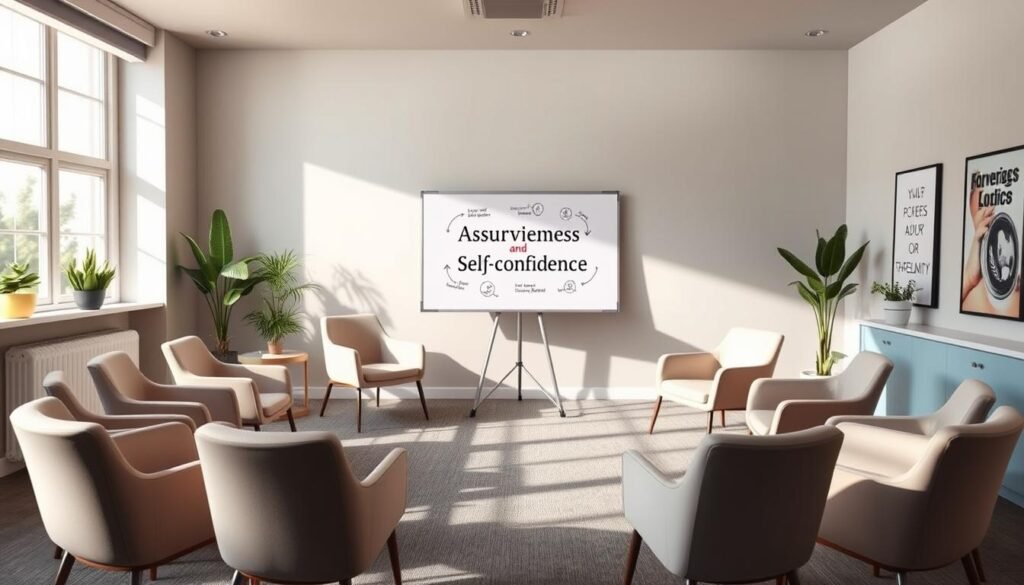Effective communication is key to success in relationships and work. Sometimes, we use “self undermining communication” that can harm our interactions.
This guide explores self undermining communication and its effects. It offers strategies to improve how we talk with others.
Key Takeaways
- Self undermining communication can hurt relationships at home and work.
- Spotting self undermining patterns is step one to better communication.
- Boosting self-esteem and mindfulness helps overcome self undermining habits.
- Getting feedback and help can address communication issues.
- Developing good communication skills is vital for personal growth.
What is Self Undermining Communication?
Self undermining communication harms our relationships. It shows up as negative self-talk and communication patterns that lack confidence.
We often downplay our achievements when praised. We might say, “It was nothing” or “Someone else could do better.”
This self-sabotage makes us seem less capable. Others may see us as less confident than we really are.
We sometimes use too much apologetic language. Saying “I’m sorry” or “I may be wrong” too often weakens our ideas.
This can hurt our credibility and authority. Recognizing these patterns helps us break the cycle of self-undermining.
We can build more confident and empowering interactions. This leads to better personal and professional relationships.
The Impact of Self Undermining Communication
Self undermining communication harms personal relationships and workplace dynamics. It strains interactions and hinders professional growth.
In personal relationships, it erodes trust and leads to conflicts. This negative pattern can damage friendships, romantic partnerships, and family bonds.
At work, self undermining creates a toxic environment. It affects team cohesion and productivity.
This behavior can limit career growth. Coworkers may see it as a lack of confidence.
Overcoming self undermining is key for healthy relationship issues. It helps build stronger connections and unlocks potential.
Recognizing these patterns is important. Improving self-talk can foster a positive work culture.
Identifying Self Undermining Communication Patterns
Self-awareness helps spot harmful communication patterns. By studying our behavior, we can find areas where we hinder our growth.
Negative self-talk is a key issue. It shows up as constant criticism or self-doubt.
Learning to spot these patterns is vital. Changing our inner voice can boost our communication analysis skills.
Being open to communication analysis can help. Input from others can reveal our behavioral patterns.
Self-awareness is key to better communication. Looking at our habits helps us grow and improve.
The Connection Between Self-Esteem and Communication
Self-esteem greatly impacts how we communicate with others. People with high self-confidence tend to communicate more effectively.
Those with low self-esteem often struggle to connect with others. They may use self-undermining communication patterns that hinder relationships.
Healthy self-esteem is key for open and honest communication. It helps us express thoughts clearly and listen actively.
Strong self-esteem improves our relationships. It also boosts confidence in social and work situations.
Low self-worth can lead to communication problems. People may doubt themselves or downplay their abilities.
This can result in passive or aggressive communication styles. These styles can further damage self-confidence and relationships.
Building a positive self-image can unlock better communication skills. Try self-reflection and seeking feedback from trusted friends.
Practice positive self-talk to boost your confidence. With strong self-esteem, you can communicate better and build deeper connections.
Strategies to Overcome Self Undermining Communication
Good communication skills are key for personal and job growth. But bad habits can hold us back and hurt our confidence.
We can use strategies to build better habits. These help us speak up and express ourselves more clearly.
One key strategy is assertiveness training. It teaches us to share our needs and thoughts respectfully.
This helps us stand up for ourselves. It also creates better talks with others.

Confidence building exercises can also help a lot. These include positive self-talk and noticing our successes.
When we feel more sure of ourselves, we can share ideas better.
The key is to build effective communication skills. This means listening well and showing empathy.
It also means being true to ourselves when we talk. These skills help us break free from bad habits.
The Role of Feedback in Improving Communication
Feedback is vital for better communication. It helps us grow and learn from others.
Feedback shows us our strengths and weaknesses. It can help us develop a growth mindset.
Ask trusted friends or coworkers for honest opinions. Their insights can help you improve your communication style.
Listen to feedback with an open mind. Don’t get defensive or make excuses.
Regular feedback helps build self-awareness. It can improve your communication skills and relationships.
Embrace feedback as a chance to learn. This approach is key for effective communicators.
Mindfulness Techniques to Enhance Communication
Modern communication can be fast and overwhelming. Mindful techniques can help us connect better and be more aware.
We can use mindful communication to improve our present-moment awareness. It also boosts our emotional intelligence.
The “stop, go, wait” method is a powerful tool. It helps us pause when we feel triggered during talks.
We can take a deep breath and choose our response. This mindful communication approach prevents hasty reactions.
Active listening is another key technique. It means setting aside our own thoughts to truly hear others.
This builds present-moment awareness and strengthens relationships. It also improves our emotional intelligence.
Mindful communication is about being fully present in our talks. It helps us handle tough conversations better.
This mindset deepens our understanding of others. It unlocks the power of mindful communication.
Case Studies: Real-Life Examples of Self Undermining Communication
Real-world examples can inspire us to improve our communication skills. Let’s look at two case studies that show personal growth.
Sarah, a marketing executive, struggled with insecurity and self-doubt. She often second-guessed her ideas and downplayed her accomplishments.
After a workshop, Sarah recognized her self-undermining patterns. She practiced assertiveness and reframed negative self-talk.
Now, Sarah is a respected leader. She confidently shares ideas and works well with her team.
Michael, a software engineer, constantly apologized during team discussions. This habit hurt his reputation and job satisfaction.
He sought help from a communication coach. Michael learned to recognize and replace his self-undermining tendencies.
He focused on his value to the team. Michael actively advocated for his ideas.
This led to better teamwork and job satisfaction. Michael experienced significant personal growth.
These examples show the power of self-awareness and effort. People can break free from self-undermining communication.
With the right strategies, anyone can improve their communication skills. This leads to personal growth and success.
Tools and Resources for Better Communication
Improving your communication skills can be easy. Many resources are available to help you get better.
“The Art of Communicating” by Thich Nhat Hanh is a great book. It teaches how to listen deeply and speak with purpose.
You can also attend a communication workshop. Or try an online professional training course.
Online self-help resources are very useful. The Gottman Institute and Nonviolent Communication websites offer helpful tools.
Podcasts like “Brené Brown: Unlocking Us” provide insightful talks. “The Happiness Lab” is another good option.
Choose an approach that works for you. Be consistent and dedicated to improving your skills.
With the right resources, you can become a better communicator. You’ll unlock your full potential in no time.
When to Seek Professional Help
Sometimes, we need expert support for communication challenges. A communication therapist or coach can help with persistent self-undermining patterns.
Communication therapy offers a safe space to explore issues. It helps develop coping strategies and effective communication skills.
Professional guidance can break negative habits. It builds healthier, more fulfilling relationships.
Signs you might need communication therapy include:
– Low self-esteem in communication
– Trouble expressing needs or setting boundaries
– Ongoing conflicts in relationships
– Feeling overwhelmed by communication-related stress
Professional support provides access to mental health resources. It helps develop skills for effective and authentic communication.
Asking for help shows strength. It’s a commitment to personal growth and wellbeing.
The Future of Effective Communication
Communication is changing fast. New styles focus on adapting to different audience needs. This shift promotes positive and inclusive talks.
Technology has created new ways to connect. Digital platforms and virtual chats are becoming more common. Communicators must learn to use these tools well.
Emotional intelligence will be key in the future. Understanding nonverbal cues and silence will be crucial. Creating safe spaces for honest talks will be important.
These changes will improve how we work together. They’ll help us understand each other better. This will lead to better relationships at work and in life.

